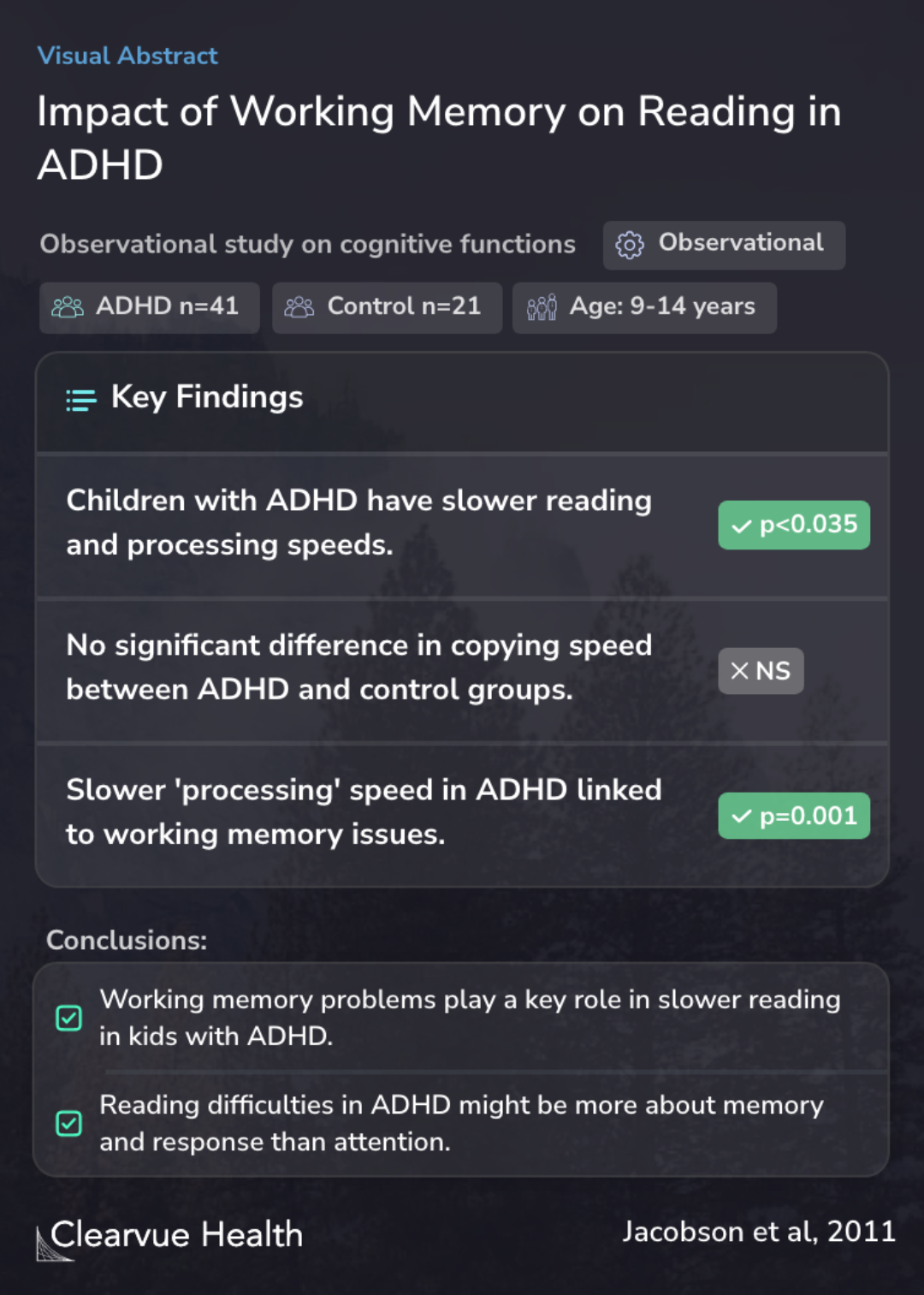Working memory influences processing speed and reading fluency in ADHD
Impact of Working Memory on Reading in ADHD
Jacobson LA, Ryan M, Martin RB, Ewen J, Mostofsky SH, Denckla MB, Mahone EM

Objectives
The study aimed to investigate the influence of ADHD on reading and cognitive speed. It focuses on understanding why children with ADHD, despite recognizing and decoding words accurately, still experience inefficiencies in reading fluency. This inefficiency potentially creates a bottleneck in other cognitive processes. The slowing observed in individuals with ADHD is thought to be linked to deficits in essential components of executive function, which underlie processing speed, including response selection.
Processing-speed deficits affect reading efficiency, even among individuals who recognize and decode words accurately. Children with ADHD who decode words accurately can still have inefficient reading fluency, leading to a bottleneck in other cognitive processes. This "slowing" in ADHD i...
Methods
Children aged 9-14 years, comprising 41 with ADHD and 21 controls, were selected for this study. These participants were screened for language disorders, word reading deficits, and psychiatric disorders. They were then tested across various measures, including copying speed, processing speed, reading fluency, working memory, reaction time, inhibition, and auditory attention span.
Participants (41 ADHD, 21 controls), ages 9-14 years, screened for language disorders, word reading deficits, and psychiatric disorders, were administered measures of copying speed, processing speed, reading fluency, working memory, reaction time, inhibition, and auditory attention span.
Results
The study revealed notable differences between the ADHD and control groups. Children with ADHD showed reduced oral and silent reading fluency and reduced processing speed, mainly due to deficits on WISC-IV Coding. In contrast, there was no significant difference in copying speed between the two groups. Importantly, after adjusting for various factors, slowed processing speed was significantly associated with verbal span and measures of working memory. This association suggests that abnormalities in working memory and response selection might significantly impact reading fluency deficits in ADHD.
Compared to controls, children with ADHD showed reduced oral and silent reading fluency and reduced processing speed-driven primarily by deficits on WISC-IV Coding. In contrast, groups did not differ on copying speed. After controlling for copying speed, sex, severity of ADHD-related sym...
Conclusions
The study's findings highlight the crucial role of working memory and response selection in the slower reading speeds observed in children with ADHD. These factors potentially have a more significant impact on reading difficulties in ADHD than problems with orienting attention or perceiving stimuli. The study's results are consistent with previous research showing a link between ADHD and slower processing speed, underscoring the importance of addressing working memory deficiencies, which can potentially be improved with practice.
Abnormalities in working memory and response selection may play an important role in deficits in reading fluency in ADHD, potentially more than posteriorally mediated problems with orienting of attention or perceiving the stimulus.
Key Takeaways
Context
A 2010 study by Goth-Owens TL et al. highlighted slower cognitive interference speed in children with inattentive ADHD compared to those with combined-type ADHD and non-ADHD controls, indicating unique cognitive challenges in processing speed for these children.
Furthermore, ADHD's impact on working memory has been documented, with brain imaging studies revealing less activity in regions associated with working memory. This deficiency in working memory can be exacerbated by anxiety and affects even high-IQ individuals with ADHD.
Notably, a study by Klingberg et al. in 2002 showed that training and practice could significantly improve working memory and reasoning skills in children with ADHD. These studies provide a broader context to understand the specific findings of the current study, indicating a consistent pattern of processing and working memory challenges in children with ADHD.